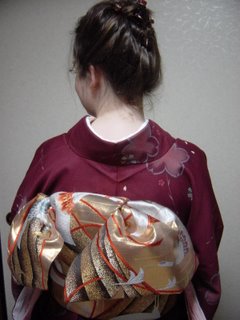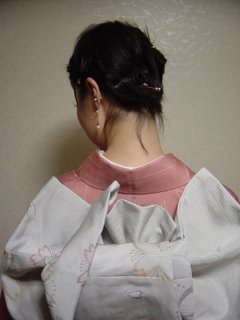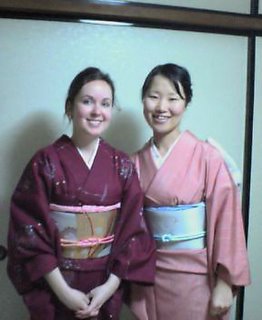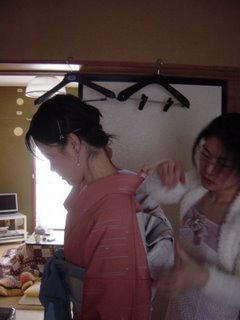30 January 2006
The Sweet Potato Man
One little truck, however, winds through the streets in all seasons. The size of a small garbage truck, with large strips of firewood and a mysterious brown box in the bed, this old, dirtied, little truck is driven by the sweet potato man. The sweet potato man is much younger than you’d expect, and instead of pushing a cart through town and yelling, he plays a recording from the loudspeaker on top of his vehicle. “Oishii! O imo, oishii yo!” which translates roughly as “Soooo good! Sweet potatoes, delicious sweet potatoes!” Then he sings other Japanese phrases which I imagine to be, “Come get your sweet potatoes! You know you want one! They’re soooo good!”
I imagine a lot of people could be annoyed by the sweet potato man, but I was quite charmed by him on my first day in Fuji. I thought the advertising was romantic, like the ice cream truck or the milk bottle deliveries I was born too late to experience. The sweet potato man always makes me smile, because he reminds me of some idyllic time in America when neighborhoods were safe and you could buy treats with only a few coins. I’m a fan of sweet potatoes and always wanted to try one, but with the echoing loudspeaker I could never tell exactly where the truck was, or when it could come by my driveway.
Today was a different story. My arms were loaded with grocery bags after work. I was tired and the peach sky was cold. But I smiled because I heard the potato man. Then, I realized he was coming up my street! He was right in front of me! I saw a little girl walk to the end of her driveway, and as the truck pulled over I stopped to watch. I felt like a tourist for the first time in Japan – my presence was turning a mundane occurrence into a spectacle. But I made no attempts to hide my blatant mental note-taking. It felt good to watch for once, instead of always being the subject of observation.
The little girl, who was about 5 years old, was one of the most beautiful little girls I’ve ever seen. Her dark hair was in Heidi plaits on either side of her head, and her almond-shaped eyes were as huge as an anime characters’. I was obviously making her self-conscious, and as she awkwardly pushed wisps of hair out of her eyes, she threw sideways glances at me during her dialogue with the sweet potato man.
The sweet potato man was thin, somewhere in his 30s, with a kind and sun-worn face. He was extremely gentle with the little girl, which made me think he had children around her age. Dutifully, as if by routine, she asked for 3 potatoes, and he nodded like he already knew how many to give her. The man went to the side of his truck, pulled on some gloves, and opened a rusted, heat-blackened, brown metal box. It was basically a portable oven, and the smoky aroma that escaped when he lifted the hatch was like potion. It took me a split-second to decide I wanted one, too. The smell was warm and sweet and spicy, very three-dimensional even though I was a good 10 feet away. The man dropped 3 long, purplish potatoes into a plain paper bag, carefully accepted change from the little girl, and showed her where to hold the bag since the potatoes were still hot. She smiled at him shyly, then turned and ran towards her apartment, obviously glad to escape my stare.
The potato man looked at me for the first time then, with my purse and coat and grocery bags, and I saw the strain flash off his face, replaced by something else when he decided I was “safe.” Perhaps I was not as much of an outsider as he thought. I lived in this neighborhood.
“I’ve heard you almost every day for the past 6 months,” I wanted to tell him. But instead, I said only, “How much for one, please?”
My potato plopped into the bag and he carefully folded the top as if it were expensive packaging. “It’s still hot, so please be careful.”
“Yes,” I said, and we smiled. My miniscule but sufficient Japanese skills were an obvious relief to him.
It was only 5 o’clock but I ate the potato immediately. The flesh inside wasn’t orange, but instead a dirty-banana-yellow, and it was so delicious there was no need to add anything. It’s amazing that something can simply be yanked from the dirt, heated for a while, and come out tasting so sweet and tangy and spicy and satisfying. I had a glass of red wine but not too much else for dinner.
I hear the sweet potato man all the time, but now I know what all the fuss is about.
17 January 2006
Should We Wait for Moss?
Tonight I wanted to unwind somewhere alone, but not in my apartment. I wanted a coffee-shop atmosphere that was closer than a 40-minute train-ride away. I decided that Mos Burger, only 15 minutes away, was my best bet.
I ordered oshiruko (a kind of sweet, red-bean soup with rice cakes) and pulled out a book. A few minutes later 2 students plopped down at my table. I was in the mood to zone out and read, but I really love my "kids" (as teachers have an annoying habit of calling them), so I welcomed the interruption. (In fact, I was amazed they sat down without even speaking to me first. At school they'd be too shy to approach like that.) I'm surprised by how much more relaxed around me the students are outside of school. They are even more willing to speak English, as if being off school grounds gives them more leeway to make mistakes. We had a great discussion about pet rabbits, cram school, Australia...and I discovered some fellow aspiring writers. I love the students.
After cramming down their burgers before biking off to cram school (extra math study -- don't you know Japanese children don't sleep?), the girls left and I returned to my book. About 2 hours later I felt someone staring at me. So many people stare at you outside of Tokyo that I didn't really take note...until the man did something no stranger has done before: he spoke to me, in English.
"Excuse me, may I talk with you?" he asked politely. He was a fairly attractive, early-to-middle-aged businessman. I'm not the kind of girl who automatically checks for wedding rings, so I don't know if he was married or not. In his finely-tailored, expensive suit, he looked out of place sitting behind a wadded Mos Burger wrapper and a paper cup. I realized then he'd finished eating some time ago and had been staring at me for longer than I thought.
My natural reaction to strangers who approach me in any way is to totally reject them. Especially if I am obviously alone, and the stranger is obviously male. I am terrified of that situation. I've never felt unsafe in Japan, but I'm not one to throw such caution to the wind. I remember one night in Paris, I happened to be the only passenger in my metro car. A man got on at the far end, but with each stop, sat closer and closer to me. We remained alone in the car, and internally I was freaking out. I was planning fake-out routes that would lead him far away from my real apartment, racking my brain for cafes that I knew would still be open...desperately crafting an escape should this man decide to follow me home. Before too long, I watched his mouth open in slow motion to speak to me, and all I could think was, "Shit!"
"Good evening," he said in slurred French. "Will you sleep with me?"
I glared at him.
"No," I said firmly, with a "and that's the end of this conversation" tone.
The man shrugged.
"Okay, well...can I have a cigarette, then?"
I told him I don't smoke, and fortunately, he left me alone.
So naturally, I was annoyed and nervous when this Japanese man spoke to me. Who cares how nice or affluent he looked. I'm alone; can't he see that I'm alone? How rude to put me in this uncomfortable situation. I could tell immediately that his English was too good for the "I just want to practice my English" excuse.
"Actually, I have to finish this," I said, pointing at my book with urgency. I made my expression as pained as possible. "I'm sorry."
"Oh, I see," he responded, looking incredibly disappointed, and worse, lonely. Turning back to my book, I started to feel guilty.
Guilty! Why did I feel guilty? I started rationalizing. All the kindness you have been shown by strangers in this country, and you're so self-centered you can't even speak to this man in a well-lit, public place. Maybe he looks lonely for a good reason. Maybe he was just trying to add a little variety to his boring night at Mos Burger. Maybe you should just put down the book and talk to him. Besides, your bus comes in 30 minutes, so you have an excuse to leave if he's awful.
I looked up at him then, debating whether or not to get his attention after turning him down. But soon he looked back at me, made eye contact, and said, "May I just ask you one question?"
So I said yes, and ended up having a very pleasant, entertaining conversation with this man who had just moved to Fuji from Tokyo. He missed the big city, and he was bored. Although he never lived abroad, his English was superb and he was obviously an intelligent, well-spoken man. Towards the end of the conversation he asked my name. (He never did ask for a phone number or email address, which made me feel much safer chatting with him.) I told him my name and then tried to make the "Rollin, rollin, rollin!" joke. (Japanese men seem to think the pronunciation of my name sounds like "rolling," and more than one person has started singing that song when I tell them my name.) So I tried to make him laugh. But instead, he seemed very serious, almost sad, and said,
"What does that mean, anyway? Rolling? I know it means moving on..." he said, and made a forward-rolling motion with his hands. "So that must mean you have a wandering spirit -- never in one place for too long." And for only the second time he looked straight into my eyes.
I didn't say anything but just smiled at him. I felt oddly exposed after that comment, as if he'd unexpectedly pegged my character 20 minutes into the conversation. I'm having a lot of trouble deciding if I want to stay in Japan for two years, or move on to something different after one.
"Wandering spirit," I repeated. "Yes, maybe so." And while the idea made me happy, it only seemed to make him sad.
Most Japanese people barely express their emotions in public, much less to someone they hardly know. The secret is to watch their eyes. Even if they don't make eye contact, you can see a lot in someone's eyes. Not only inside them, but around them: most likely if a Japanese person is sad or stressed, it will show only in the delicate skin around his eyes. And I could see, just barely, his muscles tense when I said that.
Much later, I remembed a conversation I'd had with Mayumi. We were running around a temple garden like little kids, excited by our new discovery of such a beautiful place so close to our school. There was, of course, tons of moss flowing softly over the garden stones.
"Look," I demanded. "It's so beautiful."
"Yeah," Mayumi said. "Don't you say, 'A rolling stone gathers no moss'?"
I smiled at Mayumi and laughed as my peaceful temple visions blurred with Mick Jagger and that huge tongue.
"Right." I said, returning my attention to the green fuzz.
"Yeah." Mayumi pressed. "There's one example of how our cultures can be totally opposite. You think it's good to keep moving, because gathering moss is a bad thing, and it means you've been in one place for too long. But in Japan we think moss is beautiful. We have the exact same expression, but with a completely opposite meaning. We also say: a rolling stone gathers no moss. But we want the moss. If you're constantly on the go, if you never stay in one place, you'll never grow any moss. It's good to just be still."
It wasn't until much later, in the bathtub, that it occurred to me why my joke may have dampened the Japanese man's spirit. Maybe he was hoping I would just sit still.
14 January 2006
Thank You, Ms. Rice
--Washington Post
12 January 2006
Gomi, Poi! Mo iikai!
I have avoided this topic for quite some time, for fear of sounding paranoid or overly-attentive to detail. But now it's gone on long enough, and it's time I tell you all about it.
Japan has very strict garbage-sorting rules: what to burn, what not to burn, what to cut up, what to tie in very specific ribbon before throwing out, what to de-cap, what to recycle...and there are certain dates for disposing of certain materials: cardboard, aluminum, glass, broken electric stuff, newspapers, styrofoam, cloth and fabrics, plastics, large household items, small household items...ALL of these things can only be thrown away on ONE day of the month. (And each type of item has a different disposal day, so you can't just throw it out together. Everything must be sorted.) Also, what DAY you're allowed to throw things away changes every month. For example, in January I have to hold my aluminum cans until the 19th. But in February I can get rid of them on the 10th.
I dump my "normal," burnable garbage on Tuesdays and Fridays only, about one block away from my apartment. But for all other products listed above, I haul them to the dump-site about 4 blocks away. To a gaijin this seems like quite a long, complicated, ridiculous process. In fact, after a few months I quit buying aluminum cans altogether, because I don't like dealing with throwing them away. All my beer and soft-drink consumption takes place outside my home.
Because of all this sorting, I'm acutely more aware of what I throw away. I pay attention to the packaging, what the products are made of, and how fast I fill my garbage cans. Which brings me to the point of my story: I am convinced someone is going through my trash.
This is very strange, but perhaps not very surprising. Other than John, I'm the only white person for a 20-mile radius. I've run into more than one person I've never spoken to before (the cashier at the drugstore, the waitress at the coffee shop, etc.), and they have all said, "Oh, you're the teacher!" It's a strange feeling to know that everything you buy, consume, and do outside your home really IS being monitored by someone else. Considering how interested people are in what goes into my buggie at the grocery store, it may not be shocking that people are interested in what goes into my trash.
How did I come to this conclusion? I am very punctual about my dumping (hah), and I always dump on the correct day and in the correct place -- along with everyone else in my neighborhood. By the time I come home from work, all the garbage is removed, and the street corner is left tidy and blank...except (!) for a few things that have blown up and down the street. Those few things always belong to me.
Now, I always tie my garbage bags closed, in the "correct" way, as carefully instructed by my Japanese friend. So I tie, dump, and dispose of my trash in exactly the same manner, on exactly the same days, as everyone else in my neighborhood. Yet my trash is the only trash I see strewn on the road. I have seen things that could have only belonged to me: wrapping paper from friends at home, empty bags of candy that I just bought for students, packaging for the exact same pen I just bought, small boxes that covered presents from Japanese friends, and (the real kicker) a Crest toothpaste box that could have only come from me, from America, as such toothpaste does not exist in Japan.
The first time this happened, I blamed it on the wind, even though no one else's trash was lying about. The second time this happened, I blamed it on my bag-tying skills, even though I knew that was a stupid excuse. The third time this happened, I blamed it on the garbage men, even though they didn't spill anyone else's garbage. But today was the tenth, yes the tenth, time this has happened, and I thought that was enough evidence to provide me with a post.
It's funny: even though my trash no longer "belongs" to me, the thought of someone picking it apart still makes me feel strange and self-conscious, even violated if it's taken to extremes. I mean, do you really want someone else inspecting your garbage? No. You toss the stuff one time, and forget about it. But in Japan, I find myself thinking, "Gomi, poi! Uhhh....mo ikkai."
11 January 2006
More Tanka
A tanka, which is about 1300 years old, is structured by syllables of 5 - 7 - 5 - 7 - 7. But of course those are lost in translation. The meanings still get to me, though.
The following are my favorites, because reading them is like looking at my own brain. I know exactly what these young authors are talking about.
When I turned
the page of my calendar
at the end of the month,
the scene in my room
changed a bit.
-- H. I.
Mt. Fuji,
which I see
on my way to school
in the morning,
always makes me stop.
-- A. F.
The longest telephone call I've ever made
was to my mother.
Talking with her
somehow
calms me down.
-- M. M.
If it were Manga,
I could skip unpleasant days,
even test days,
by just writing
"A few days later..."
--Y. K.
From the time I began
to search for "What I could be,"
"What I want to be"
faded
further and further away.
-- M. T.
When I take up my pen
in the soft afternoon sunlight,
prisms of light
play in the margin
of my notebook.
-- S. S
Resting my pen,
I look through the window's glass
at the western sky,
and my heart is moved
by the evening glow.
-- A. O
Hope you enjoy. Maybe I'll write some of my own. Then you really could look at my brain.
09 January 2006
Tanka
A student mailed me a New Year's card, and when I sought her out in a crowded hall to say thank you, the look on her face raised my mood about 3 notches. Later, a teacher approached me with a thin book and said, "I heard you like haiku. I want to give this to you."
"This" was a collection of 100 tanka (like haiku but longer) written by Japanese students. The book was edited by professors at Toyo University, who had to choose the best 100 poems from 60,000 submissions. (No, there are no typos in that number.) The book was an effort to pass on Japan's traditional history of structured poetry, and also to acknowledge and contribute to (support? help? further?) globalization by translating each poem into English. The teacher's gesture and thoughtfulness brought me up another 5 notches. I can't wait to read this. But I had to stop after the first poem, because it resonated with me so well that I just couldn't move on to the second one, without letting this one linger:
I wonder
what my elder sister
who left home saying,
"I'll look for the meaning of life"
is doing now?
--Sachiko Matsuda
05 January 2006
Wouldn't Ya' Know
Kimono Day!
So the idea is to look curve-less, which may seem strange to westerners. But fear not, some parts of the kimono are designed for purely "sexual" purposes. (Why else is "scoop-neck" or "mini" in a western woman's vocabulary?) The most obviously sexy part of the kimono design is around the neck. The nape of the neck is considered very sexy, I'd venture to say almost erotic, when exposed. This is one reason why the pinning of all the layers is a delicate process: the kimono is wrapped very tightly, but must be done in such a way that the collar stays away from the back of your neck. The effect is really beautiful. See pictures.
Also, the big "bows" in the back are created by a waistband called an obi. There are many ways to tie the obi and of course everything is symbolic. The one I have was only worn by the highest caste of women in the Edo Period (Meiji Period? Meg please help!). Sometimes it's used today in weddings. Other parts of the kimono symbolize different things about rank and age and purpose, from the colors and designs on the fabric to the length of the sleeves.
Anyway, it took 45 minutes for Migiwa to complete both of our kimonos. There are so many layers, special knots, wrappings, pinnings, and unpinnings, the process is truly an art that requires both muscle (to wrap so tightly) and patience (to be yanked and wrapped and pinned for about 20 minutes). While we were getting dressed, Mayumi put on a Kelly Clarkson CD, and I couldn't help but laugh at the irony: the stereo was blasting "It Feels Like I Can't Breathe" as Migiwa was tying all my knots.
I don't mean to complain, though -- it's quite a lovely experience and, with hairdos and more make-up than usual, we felt quite feminine. It was somewhat similar to the prom. After we spent most of the day getting dressed, we went to the temple, where we prayed, read our fortunes for the year, and then had coffee and cake (uh, a very tiny piece of cake) at a coffeeshop. Then we came home and danced around Mayumi's apartment a bit before finally getting undressed and calling it a day.
Hope you enjoy the photographs. Mayumi doesn't realize how beautiful she is.
03 January 2006
New Year's
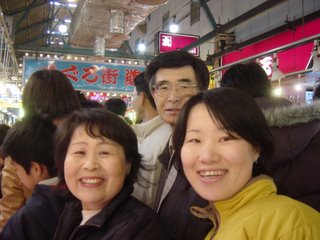
I spent New Year's--a very important and somewhat solemn holiday in Japan--with Mayumi's family in Fujieda. Overall, it was a completely cozy, relaxing, lazy, spiritual, reflective, traditional holiday that I enjoyed very much. Her parents were so sweet and hospitable; her high school buddies were friendly and happy to speak Japanglish with me (their English was quite impressive, but I tried to throw in Japanese whenever I could, so the foreigner wouldn't totally monopolize the language of choice); I ate more rice cakes and home-cooked Japanese food than ever before; I met grandparents and brothers; I rang a temple bell and drank special sake at midnight; I bought very cheap very warm sets of long underwear; I ate my first riceburger (which was actually shrimp and vegetables); I cleaned tombstones and burned incense and prayed; I prayed some more; I watched Japanese dramas from the Edo period; I heard booming fireworks with the rising sun on the first day of the new year; I slept late; and I drank gold-flecked sake with breakfast. Needless to say it was a great welcome to 2006.
I also visited a famous fish market with Mayumi's family. Here are some pics...the orange stuff is a soupy squid mixture, the green stuff is seaweed, and the rest is self-explanatory. Mayumi's favorite treat was miniature octupii (sp?) mixed with wasabi. Uh, please pass the raw tuna with onions and hold the baby alien-wasabi-octupus. Thank you. :)
